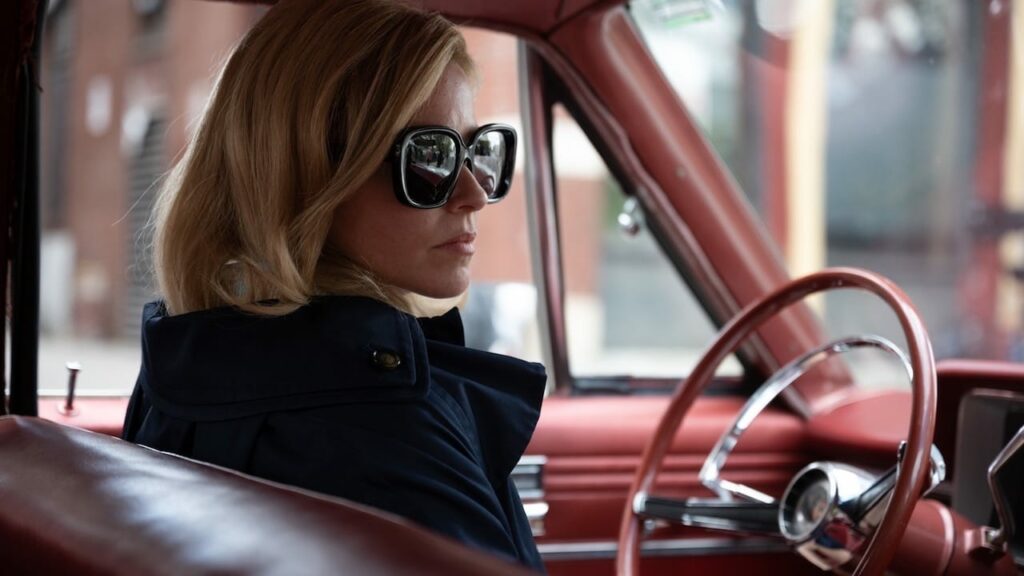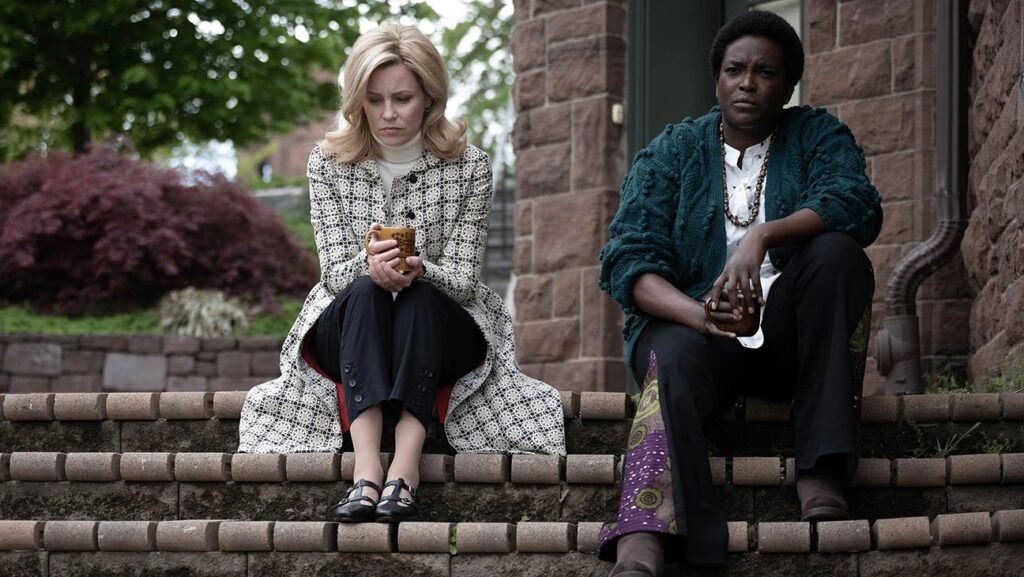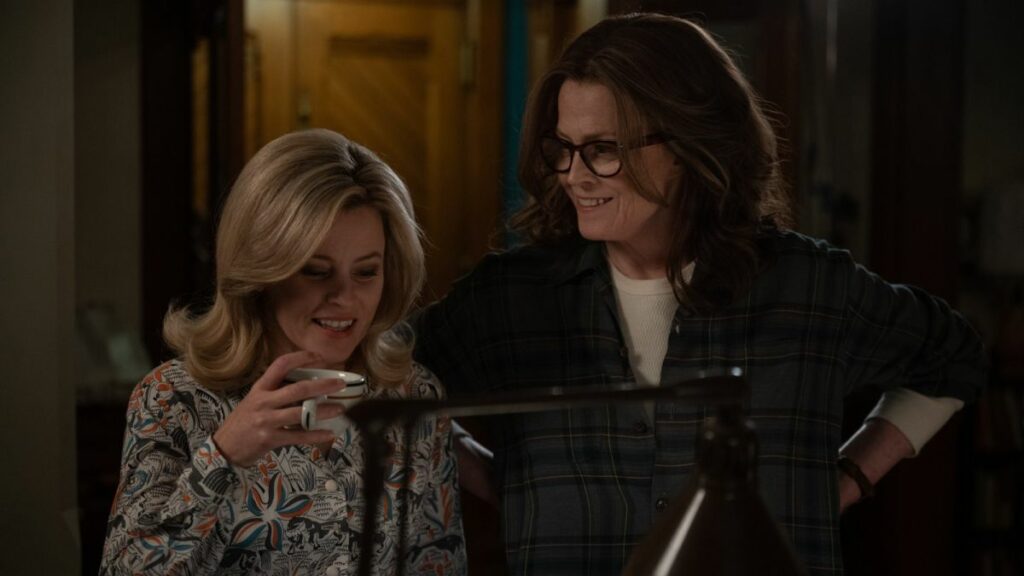Call Jane centres itself on the true story of ‘The Janes’, an underground collective of women who, in 1960s Chicago, came together to secretly provide nearly 12,000 women and girls with safe abortions. Starring Elizabeth Banks, Sigourney Weaver, and Kate Mara, the film takes place in the uncertain years that preceded the Supreme Court’s Roe vs Wade ruling on abortion laws in America.
It’s a feature that could not have come at a more depressingly relevant time, celebrating what can be achieved by a small group of people in the face of even the most seemingly insurmountable challenges.
Oscar-nominated Carol screenwriter Phyllis Nagy makes Call Jane her sophomore directorial effort from a script by Hayley Schore and Roshan Sethi. In line with the film’s UK premiere at London Film Festival and ahead of its general release, Outtake sat down with Phyllis Nagy to discuss her desire to normalise abortions as part of women’s healthcare and to veer the procedure’s treatment in film away from its associations to trauma.

What was it about this script that so appealed to you and convinced you to direct it?
Phyllis Nagy: I had never read anything about the Jane Collective. That intrigued me that there was such an organisation. But it was also the chance to work on something about a collective that sought to change how things were done. A group of women solving an unsolvable problem was something that really appealed to me. I also saw in the material a chance to do this with a lightness of touch that I think is necessary when you’re dealing with serious situations.
What do you mean by “lightness of touch”?
Phyllis Nagy: Life is not a series of traumas, generally speaking. In our filmic literature, we tend to focus on extremes and exceptions. And so, with abortion, there’s clearly a genre of film – of which I watched a whole many of them, and what struck me is they usually deal with agonising decisions, things that go wrong, and people with severe problems. And as a culture, we tend to ask art to lead our thinking on these situations. But the vast majority of women who undergo abortions don’t have that situation. Just like the majority of people who, say, have cataract surgery, don’t have a bad experience. We only ever see the horror stories. And I thought it was about time we seek to make quotidian or normalise the procedure of abortion. It’s a medical procedure that’s part of women’s health care and it is not, generally speaking, something that goes wrong. The Jane collective certainly found a way to perform thousands of abortions safely. They were not doctors, and they didn’t lose a single woman, nor was anyone seriously injured by the procedure.
And do you think the reason why abortions are so often sensationalised – for lack of a better word – in film is because of the political taboo around it, or is it just because people believe it makes for a better story on screen?
Phyllis Nagy: That’s a long conversation, but I think it has a lot to do with how the dominant culture sees women. I haven’t seen this, but someone was talking to me about the film Blonde and, if I’m understanding correctly, there is more than one abortion depicted in the film in a way that makes it all about the woman’s suffering and these tormenting decisions.

I do think this is part of a larger conversation about how women and their reproductive rights have been represented in film. Not so much on television, but in film, women are obsessed with either bearing children, not bearing children, or being too old to bear children. Infertility ruins a woman’s life, right? So, it’s not surprising if people think, “this movie is actually enjoyable to watch. How dare you?” There’s an expectation of treatment when it comes to serious subjects about.
You don’t have that expectation when it comes to films that represent men’s experience. None, because it’s the default! Mobster films are traditionally male, and they’re allowed to be funny, and violent, and whatever else, and no one questions that.
So films like Call Jane – and there are other examples of them – that are treating what will invariably be called a “woman’s story” in a way that makes it not a chore to sit through, or something that’s difficult to watch, I think are very important. They’re part of what I call the normalisation process of not only abortions, but how to view films like this. You don’t have to tell anyone what to think, or what to like. You’re putting it out there that there is another way to address these stories. There are many ways to do that, and this is the way we’ve chosen to address it. And it will have impact, because it’s not insisting that you view it through the lens of suffering. Or not – you can’t dictate the response.
There’s a whole sequence when Elizabeth Banks’ character is trying to end the pregnancy, and there’s this almost absurd comedy in how she tries to throw herself down the stairs and then breaks a limb. I like the idea of that comedy as a revolutionary act, that you can take an experience that’s always been portrayed as deeply traumatic and bleak and find humour in it. Was that the same thinking that inspired the near-10-minute scene detailing Joy’s abortion procedure?
Phyllis Nagy: Yes. I’ve never seen that. We were very careful with that scene; it was the most complex thing we shot in terms of the number of setups, and we built a set for the room, hallway, and bathroom. We thought it was really important to spend a lot of time on all of those instruments and ensure everything is correct. But it’s also a way to get people used to the fact that you are going to see this – or bits of this – procedure over, and over again throughout the film. And it’s not until near the end of Call Jane, when Joy performs her own procedure, that you see it again. That one is not as long, but it’s an entire scene in which we’re taken through this in a very different way.

Call Jane premiered at Sundance earlier this year and is now getting its general release in November. In that time, Roe v. Wade was repealed. In light of that, do you have a different perspective on the film now than you did when you first presented it?
Phyllis Nagy: No. And that’s because I’m a lot older than you are. It’s been going on forever. The same situation exists that existed in January of this year. It’s just that we haven’t seen it through the prism of that Supreme Court decision, but that decision was on the docket. We knew how that would go. Politicians pretended they didn’t know how it would go, but it was long dead. But I hope that more people will go to see this film because they now realise how urgent the matter is. That would be the trade-off. I just hope it never becomes a primer again or a how-to guide.
You gave an interview at Sundance in which you said that Call Jane wasn’t about convincing people. Do you stand by that statement now, or do you think it has the potential to change minds?
Phyllis Nagy: I don’t think that any film can have that wide-scale effect. I think the modest goal is for it to shift someone’s thinking on how necessary this procedure is to many women, not just in extreme cases, and that it can engender empathy from the other side. Can it be part of a larger conversation? Sure. But I have no expectations for that because you’re always disappointed.
Call Jane releases in cinemas on November 4th.
